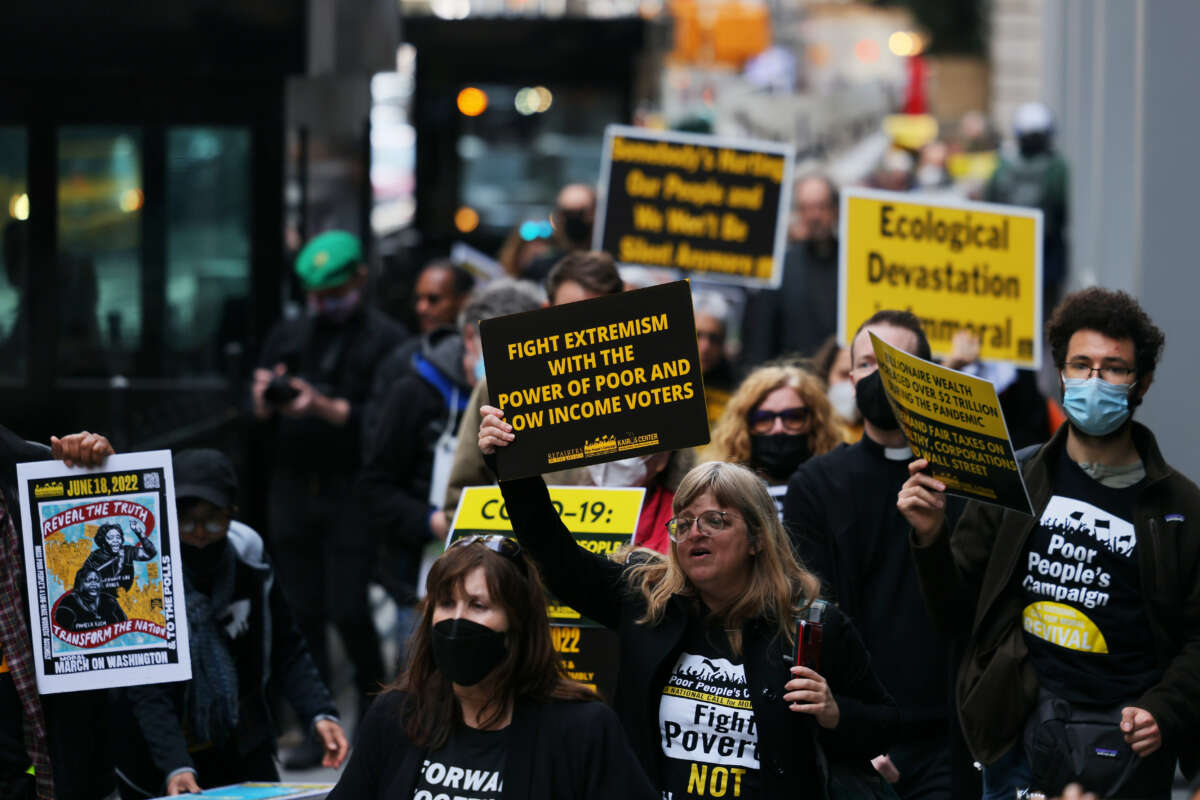Truthout is an indispensable resource for activists, movement leaders and workers everywhere. Please make this work possible with a quick donation.
Amidst all the nail-biting uncertainty over the 2024 election, one thing’s for sure: turnout will be key. This February, the Poor People’s Campaign announced plans to mobilize a powerful yet often overlooked voting bloc: the 85 million eligible voters who are poor or low-income.
The campaign crunched the numbers and determined that if this bloc voted at the same rate as higher-income voters, they could sway elections in every state. But most voting drives — and candidates — still ignore this segment of our society.
“The conventional wisdom — which isn’t very wise — is that the poor don’t care about voting,” said Poor People’s Campaign Policy Director Shailly Gupta Barnes at a February 5 press conference. “But that’s just not true.”
What’s the biggest factor discouraging low-wage people from exercising this basic right?
“Political campaigns do not talk to them or speak to their issues,” explained campaign co-chair Bishop William J. Barber II. “In our election cycles sometimes we have 15, 20 debates for president. In 2020, not one of those — not 15 minutes — was given to raising questions about how the policies of that particular party or politician would impact poor and low-income people.”
The Poor People’s Campaign is organizing to push the concerns of poor and low-income people into the center of the 2024 political debate. Their goal is to mobilize 15 million “infrequent” poor and low-income voters.
Will politicians listen?
At the press conference, pollster Celinda Lake ticked off one battleground state after another where even a small increase in participation could determine the outcome. She pointed out that in Arizona, 40 percent of voters are low-wage — and in 2020 the margin of victory was just 0.03 percent. “You’d have to be a moron to not get this,” Lake said.
What are some of the most pressing issues on the Poor People’s Campaign agenda?
The campaign and the Institute for Policy Studies just co-published fact sheets for the nation and all 50 states on the interlocking problems that hit the poor hardest: poverty and inequality, systemic racism, ecological devastation, and militarism. Several speakers spoke about these problems from their own personal experiences.
“I’m tired of companies and billionaires buying politicians who are pushing people deeper into poverty and debt,” said Matthew Rosing of Lancaster, Pennsylvania. “I’ve put up with the thankless toll of minimum wage retail jobs and back-breaking construction jobs in a state that has 19 billionaires. And because of our flat tax, they pay the same state income tax rate as I do.”
Linda Burns, a former Amazon warehouse assembly line worker, has struggled for basic labor rights and decent health care benefits. Burns was a supporter of the valiant union drive at the Bessemer, Alabama facility that Amazon eventually crushed through harsh intimidation tactics.
Burns says she was fired for her union activity, which led to the loss of her health benefits right before a needed surgery related to a workplace injury. Today she works 16 hours a day as a caregiver.
“I’ve worked too hard to have nothing,” said Burns. “We have to stand up for our rights.”
Veronica Burton spoke about the economic gulf in her community of Beloit, Wisconsin. A woman who lives “around the corner” from her is a billionaire while Burton is struggling to pay bills in the face of multiple rent increases and the low wages she earns at an understaffed child care center.
On top of dealing with her own problems, Burton often finds herself trying to help parents of the children under her care. “We’ve had mothers unenroll their children because they can’t afford their asthma medicine,” she said.
These and other organizers in more than 30 states are ready to put on their door-knocking shoes in the lead-up to this year’s election and beyond. “We are not an insurrection,” Bishop Barber said. “But you better believe we are a resurrection — a resurrection of justice and love and righteousness.”
A terrifying moment. We appeal for your support.
In the last weeks, we have witnessed an authoritarian assault on communities in Minnesota and across the nation.
The need for truthful, grassroots reporting is urgent at this cataclysmic historical moment. Yet, Trump-aligned billionaires and other allies have taken over many legacy media outlets — the culmination of a decades-long campaign to place control of the narrative into the hands of the political right.
We refuse to let Trump’s blatant propaganda machine go unchecked. Untethered to corporate ownership or advertisers, Truthout remains fearless in our reporting and our determination to use journalism as a tool for justice.
But we need your help just to fund our basic expenses. Over 80 percent of Truthout’s funding comes from small individual donations from our community of readers, and over a third of our total budget is supported by recurring monthly donors.
Truthout’s fundraiser ends tonight! We have a goal to add 122 new monthly donors before midnight. Whether you can make a small monthly donation or a larger one-time gift, Truthout only works with your support.
